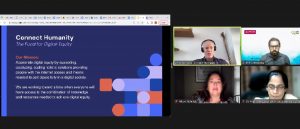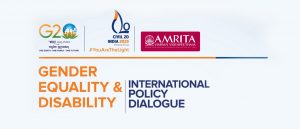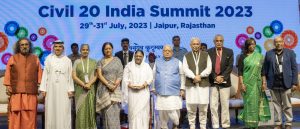The C20 Gender Equality & Disability Working Group (GED WG) held an online webinar on “Inclusive Education with Skill Development: Priorities and Policies”, on 23rd February.
More than 80 participants, representing six countries — Brazil, Bangladesh, the UK, Australia, India and the US, engaged in the conversation.
The event was initiated by welcome remarks from Ms. Nidhi Goyal, Indian Co-coordinator of the Working Group, setting the context of the discussion. The keynote address was delivered by Prof. Marica Cristina Bernardes Barbosa, eminent Brazilian physicist and Professor, at Universidade Federal do Rio Grande do Sul (UFRGS), Brazil highlighting the challenges and policy alternatives to enhance participation and promotion of women and girls in STEM education and professions.
Besides representatives from various civil society organizations, there was representation from other institutions namely, Sarah Fink, head of Athena SWAN, the UK; Prof. Leena Wadia, University of Trans-Disciplinary Health Sciences and Technology (TDU), India, Shri Shailendra Jaiswal, Executive Director, DRDO, Ministry of Defence, Government of India and Shri Uday Wankawala, Atal Incubation Centre, India.
Our Guest speaker, Dr. Sanjay Kumar Mishra, Senior Advisor, Department of Biotechnology (DBT), Government of India shared his perspectives on plausible pathways relevant to mainstreaming Equity and Inclusion in Education and Skill Development, relevant for G20 Countries.
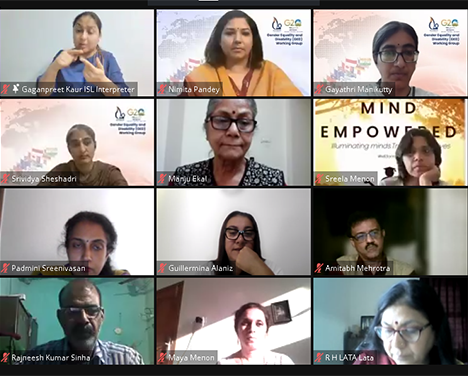
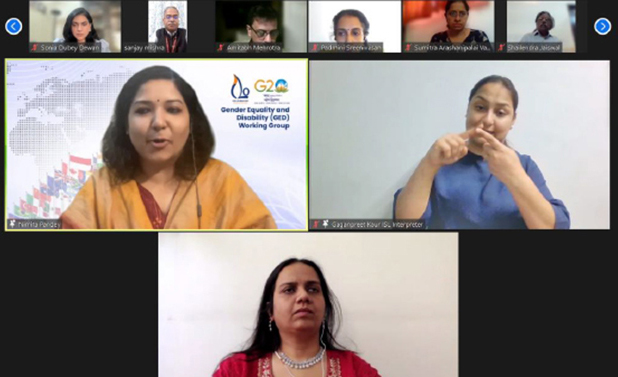
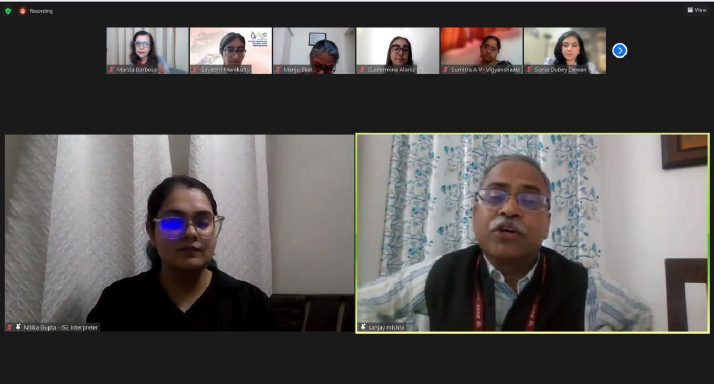
We were honored to have representatives from Rambhau Mhalgi Prabodhini, the C20 Secretariat, and international organizations like UNESCO, UNITAR, the Swedish Embassy in India and the British Council.
The event comprised two breakout room discussions on Education and Skill Development, chaired by GED WG advisory board members, Dr. Medha Somaiya, Director, MAD’s Solutions and Services for Social Initiatives, India, and Ms. Ela Ionsceu, Former Partnerships Specialist, UN Women, Turkey, respectively. Discussions revolved around key priorities, policy gaps, recommendations and best practices to promote and retain women and women with disabilities, to access education, including STEM education and vocational training for enhancing their employability quotient for sustainable livelihoods. Some of the following key priorities were discussed:
- Improving women’s and girls’ access to education including STEM Education, particularly in marginalized and rural settings
- Addressing sociocultural barriers, gender stereotypes and biases (visible and invisible), and other challenges including poverty, gender harassment & violence, child marriage, and impacts of COVID-19, preventing women and girls from accessing and completing education.
- Enhancing access to skill development and vocational training for sustainable livelihood, hindered due to discriminative learning and skilling environment and a lack of support to upgrade skills and lifelong learning, impacting the employability quotient of women and persons with disabilities.
- Supporting digital learning and digital literacy and improving access to digital technology and the skills to use it, for proportionate representation of women in the digital economy, to abridge the digital divide.
In the concluding session, summarisations of views and perspectives on education and skill development were presented, to streamline and guide the development of C20 policy recommendations.
Sign language interpreters were present for the entire duration of the event, along with auto-captions for people with hearing disabilities.
